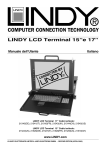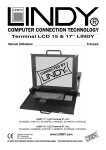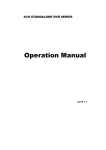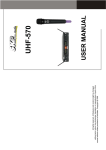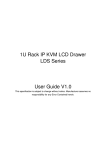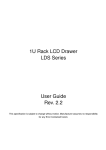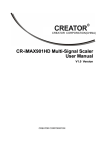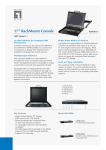Download Brother NV4750D Sewing Machine User Manual
Transcript
LINDY 15” & 17” LCD Terminals User Manual English LINDY 17” LCD Terminal No’s: 21540(DE), 21541(IT), 21542(FR), 21543(UK), 21544(CH), 21545(US) LINDY 15” LCD Terminal No’s: 21524(UK), 21526(DE), 21527(IT), 21528(FR), 21529(US), 21519(CH) Tested to Comply with FCC Standards For Commercial Use www.LINDY.com © LINDY ELECTRONICS LIMITED & LINDY-ELEKTRONIK GMBH - SECOND EDITION (APRIL 2005) User manual 15” & 17” LCD Terminals Supplied Items The LCD Terminal package consists of: • 1 x 1U, 19” rack mount console with 17” or 15” LCD screen (according to part number) and 2 locking keys • 1 x 19” mounting kit with screws and multiple rear mounting brackets for mounting to a depth of between 53cm and 100cm • 1 x 1.8m, 3-in-1 KVM system cable (2 x PS/2 mouse & keyboard, HD15 VGA at each end) • 1 x Power cable • 1 x User manual CD • 1x Short Manual (printed) Please check to make sure that the unit has not been damaged during shipping. If you encounter a problem, please contact your dealer immediately. Safety Information • In order to avoid the risk of fire or electric shock, DO NOT expose this device to liquid or a high humidity environment • Operate the LCD only at temperatures between +5°C and +40°C • No user serviceable parts. Refer servicing to qualified personnel • Carefully read all notes and instructions before using this product • This device should be securely mounted in a 19” rack enclosure • Do not use liquid cleaning products or products containing abrasives. Clean only with a soft damp cloth • Ensure there is sufficient ventilation to prevent overheating • Never obstruct or block the ventilation slots or other openings, and do not position the device in any location where there is insufficient ventilation • Use the correct 19” mounting brackets as detailed in this manual! 2 User manual 15” & 17” LCD Terminals Features • The LINDY LCD Terminal is designed for use in standard 60cm to 120cm depth, 19” cabinets. It requires a mounting depth of at least 50cm and a distance between front and rear 19” rails of at least 43cm. • The complete drawer can be fully slid in and out of the rack. • It also offers the option to pull out the LCD tray only and flip it up so that the screen can be viewed while the keyboard is hidden, and the cabinet doors are closed and locked. • 15” 1024 x 768 Active Matrix TFT LCD Screen with support for VGA, SVGA and XGA OR • 17” 1280 x 1024 Active Matrix TFT LCD Screen with support for VGA, SVGA, XGA and SXGA. Also supports SUN resolution of 1152x900 • Built-in 5 language OSD for display adjustment • Backlight lifetime of 50,000 hours • PS/2 touch pad • PS/2 keyboard and separate numeric keypad • 100-240V AC wide range power supply • Dimensions: 450/485 x 460 x44mm (WxDxH) • Weight approx. 15kg, 17kg with packaging • Environmental Specification – For indoor use only : o Temperature: 5 ~ 40° C (Operating) 1~50° C (Storage) o Relative Humidity: 10~90%, Non-Condensing KVM LCD Terminal Installation and Use Installing the drawer into a 19” cabinet Important note: Because the complete drawer provides the option to slide the LCD screen out of the rack, allowing it to be flipped up, you have to make sure that the rear brackets: 1) can be slid over a distance up to 14cm 2) do not come apart from each other when slid out 14cm Distance between 19“ rails Please measure the distance between front and rear 19” rails of your cabinet and select the appropriate rear brackets. 3 User manual 15” & 17” LCD Terminals Depending on the distance between the front and rear 19” mounting rails, the following brackets should be used: Between 43cm and 58cm, use rear single slider brackets. Between 52cm and 86cm: use short rear L-brackets plus support brackets Between 68cm and 83.5cm, use long rear L-brackets plus support brackets Note: if you require extended rear L- rackets for longer distances between the front and rear 19” rails (not cabinet depth!), please contact LINDY support. Installing the short rear brackets Please install the brackets and distance washers as per the picture to the right. Secure the washers firmly using the supplied screws. The sliding distance of the rear 19” brackets must be the same as the sliding distance of the front brackets, when mounted. 4 User manual 15” & 17” LCD Terminals Installing the long rear brackets Please select the appropriate brackets according to the distance between your 19” rails (see Important note on page 3) and install them as per the pictures. C You will need the front support brackets (A), outer slider brackets (B), inner slider bracket (C)..... B A ....and either the short or long Lbracket (DS and DL). DS DL First, position the front support bracket (A) with the outer and inner slider brackets (B, C) to the back of the drawer as shown in the picture to the right. Select the long or short L-brackets (DS or DL) to fit your cabinet’s 19” rail distance. Make sure they can slide by an additional 14cm without falling off. Insert the appropriate L-bracket (DS or DL) into the inner slider bracket (C) and fix it with the central screw, ensuring the brackets cannot fall off each other when slid. Next, adjust the inner (C) to the outer (B) slider bracket using one central screw in the appropriate position. Make sure it can slide over the necessary distance of 14cm. Central Screws to fix brackets Long Rear brackets with shortest L-bracket installed Long Rear brackets with long L-bracket installed and pulled out 5 User manual 15” & 17” LCD Terminals Mounting the drawer into the cabinet Fix the front 19” brackets of the drawer onto the front side of your 19” cabinet. Fix the screws only to the slider bracket - not to both brackets! To slide the complete drawer out of the 19” rack, unscrew the two thumbscrews on the front of the 19” bracket. This allows the LCD panel to be flipped up. LCD ON/OFF SWITCH Fix the screws on the back of the drawer onto the rear side of your 19” Cabinet. Please note: You can hide the handle of the keyboard drawer inside the drawer. 6 User manual 15” & 17” LCD Terminals Cable connections 1. Ensure the computer or KVM switch you are connecting to is switched OFF! 2. Use the included ‘3-in-1 2 x PS/2 + 1 x VGA’ cable to connect to the console ports of your computer or KVM switch 3. Connect the power cable to the mains and to the back of the KVM LCD Terminal 4. Switch ON the power to the KVM LCD Terminal 5. Switch ON the power to the connected PC or KVM switch LCD DISPLAY For adjustment and configuration of the LCD please follow the LCD on screen menu and select the appropriate language. Please note that an LCD display requires a frame rate of around 60Hz only! Therefore please adjust the graphics signal of all attached computers to a maximum of • 1024x768 @ 60Hz if you are using the drawer with 15” LCD display or • 1280x1024 @ 60Hz if you are using the drawer with 17” LCD display. If any graphics card is set to a frame rate of above 72Hz the LCD may not show a picture – this is not a fault of the LCD but a general feature of any LCD display. In such cases connect a standard monitor to the computer and set the graphics card to the correct resolution and frame rate as detailed above! The 17” LCD display also supports SUN® resolution of 1152x900. The LCD Drawer features a front power switch to switch off the LCD display. It can be used to switch off the LCD when the screen is flipped up in front of the cabinet. When the screen is flipped down (to slide the complete drawer into the cabinet) the LCD is switched off automatically. 7 Radio Frequency Energy Certifications Shielded cables must be used with this equipment to maintain compliance with radio frequency energy emission regulations and ensure a suitably high level of immunity to electromagnetic disturbances. FCC Compliance Statement (United States) This equipment generates, uses and can radiate radio frequency energy and if not installed and used properly, that is, in strict accordance with the manufacturer’s instructions, may cause interference to radio communication. It has been tested and found to comply with the limits for a class A computing device in accordance with the specifications in Part 15 of FCC rules, which are designed to provide reasonable protection against such interference when the equipment is operated in a commercial environment. Operation of this equipment in a residential area may cause interference, in which case the user at his own expense will be required to take whatever measures may be necessary to correct the interference. If this equipment causes interference, what can be determined by turning the equipment on and off, the user is encouraged to try to correct the interference by one or more of the following measures: a) Reorient or relocate the receiving antenna. b) Increase the separation between the equipment and receiver. c) Connect the equipment to an outlet on a circuit different from that to which the receiver is connected. d) Consult the dealer or an experienced radio/TV technician FCC WARNING Changes or modifications not expressly approved by the manufacturer could void the user’s authority to operate the equipment under FCC Rules. Canadian Department of Communications RFI statement This equipment does not exceed the class B limits for radio noise emissions from digital apparatus set out in the radio interference regulations of the Canadian Department of Communications. Le présent appareil numérique n’émet pas de bruits radioélectriques dépassant les limites applicables aux appareils numériques de la classe A prescrites dans le règlement sur le brouillage radioélectriques publié par le ministère des Communications du Canada European EMC Directive 89/336/EEC CE statement This equipment complies with the requirement for CE mentioned in the European Directive 89/336/EC and Standards EN55022 and EN55024. © LINDY ELECTRONICS LIMITED & LINDY-ELEKTRONIK GMBH - SECOND EDITION (APRIL 2005)








